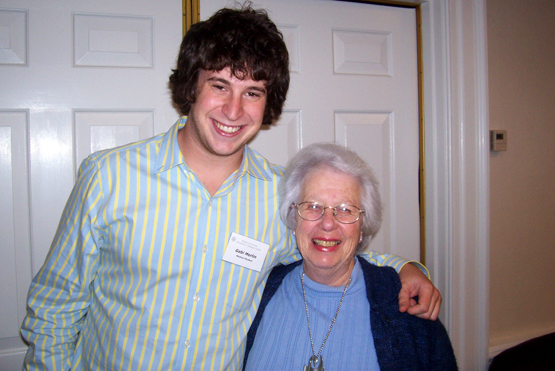Pairing Up with Alzheimer’s Patients
MED students learn the person is important, not the disease

Barbara Abrahams cannot initiate conversation, but she can burst into song when she recognizes music from the past. “I do not think I have ever met anyone as happy as Barbara when she is singing along to songs that she remembers,” says Gabriel Merlin (MED’12). “Although she could never put it in words, I think that Barbara subconsciously understands that she is recognizing something when she listens to music.”
Abrahams, who has Alzheimer’s disease (AD), participates in the Boston University School of Medicine PAIRS Program. She is Merlin’s “buddy.” They enjoy watching movies together (especially Cary Grant films), playing Scrabble, and listening to music. “During our visits, we often go to Mel’s for lunch, and because we are both avid Red Sox fans, we have taken in a game at Fenway,” Merlin says.
Under the auspices of the BU Alzheimer’s Disease Center (ADC), these pairings are part of a volunteer educational program for first-year medical students that fosters relationships between medical students and older adults suffering from AD.
“The PAIRS program is a unique opportunity for medical students to increase their knowledge of AD and better appreciate the support-related issues that patients face,” says PAIRS director Angela Jefferson, “while improving students’ communication skills for working with aging adults with cognitive impairment.” Jefferson is a MED associate professor of neurology and ADC Education Core director.
The program, launched in 2007 with seven students, has more than doubled in the past year. As well as providing a valuable community service and hands-on educational experience, the program offers students exposure to important elements of neurology, geriatrics, neuropsychiatry, and neuropsychology. The student-patient pairs spend at least four hours a month together during the academic year. Students also attend monthly meetings with PAIRS Program faculty, staff, and fellow participants to discuss their experiences and interactions with patients and their families.
“Because I had done neuroscience research and was very interested in diseases related to the brain, I thought this would be a great opportunity to get involved in an extracurricular activity,” Merlin says. “I never realized that it would develop into a relationship that will impact me for the rest of my medical career.”
Shireen Heidari (MED’12) and her buddy, Robert Allen, spend much of their time together at Boston’s Museum of Fine Arts. She describes Allen as a cheery man who loves music and art.
“As our time progressed and he began to trust me more and admit moments of difficulty,” says Heidari, “I realized how much of a privilege it was to get an inner window into his disease experience. Medical students don’t always get such personal experiences or accounts, yet such experiences enrich our understanding so that we look out for the person as well as the disease.”
“My mother has always been a supporter of medical research, and when the opportunity came up to participate in a program to help medical students understand Alzheimer’s, she was ready to go,” says Linda Abrahams, Barbara’s daughter and principal care provider.
“Gabi, her buddy, is an exceptional young man. When we first met him, I warned him that my mother had lost much of her verbal skills, placing him at a disadvantage. He astounded me by saying he was the lucky one, because he would just have to find different ways to communicate with her. He used music, games, and trips to interesting places. My mother lights up like a Christmas tree when she sees him.”
“There are no rules of the game,” says Merlin. “Just being in the moment with Barbara and trying to make that moment one of enjoyment and engagement rather than frustration and loneliness. I have thought about what it must be like for her daughter to be reminded daily about the loss of the mother she once knew, and yet put her own needs aside to care for her mom. It requires a great deal of bravery and resilience. I have learned as a future doctor that I will need to pay close attention to the health of caregivers as well as of patients.”
For Heidari, “it is not just about understanding how the plaques and tangles will slowly render much of the brain ineffective. It is about making sure one takes the time to ensure that the patient and family have the support they will need as things get harder and they lose the kinds of interactions to which they are accustomed.”
In addition to MED donor support, the PAIRS program is funded by educational grants from the Kenneth B. Schwartz Center, the Arnold P. Gold Foundation, and the National Institute on Aging.
More information on the PAIRS Program is available here, or by e-mailing Nicole Cantwell at nicole27@bu.edu.
Mary Hopkins can be reached at mhopkin@bu.edu.
Comments & Discussion
Boston University moderates comments to facilitate an informed, substantive, civil conversation. Abusive, profane, self-promotional, misleading, incoherent or off-topic comments will be rejected. Moderators are staffed during regular business hours (EST) and can only accept comments written in English. Statistics or facts must include a citation or a link to the citation.